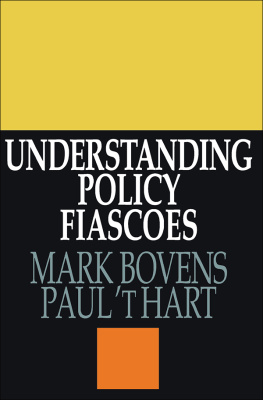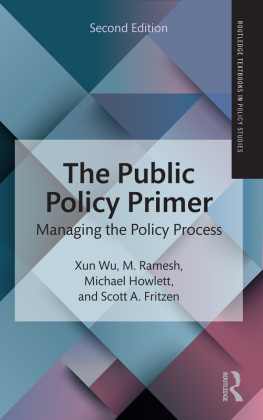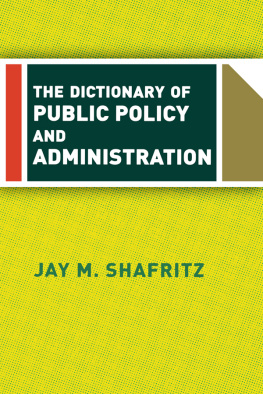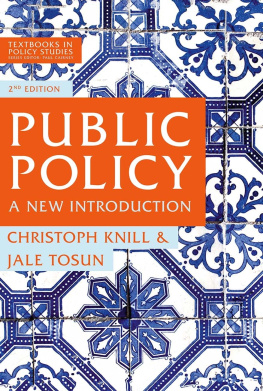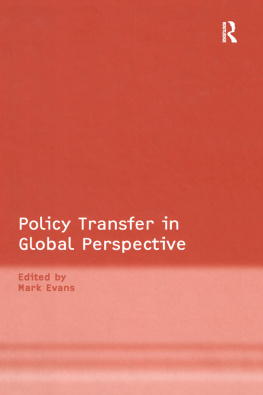First published 1996 by Transaction Publishers
Published 2017 by Routledge
2 Park Square, Milton Park, Abingdon, Oxon OX14 4RN
711 Third Avenue, New York, NY 10017, USA
Routledge is an imprint of the Taylor & Francis Group, an informa business
Copyright 1996 by Taylor & Francis.
All rights reserved. No part of this book may be reprinted or reproduced or utilised in any form or by any electronic, mechanical, or other means, now known or hereafter invented, including photocopying and recording, or in any information storage or retrieval system, without permission in writing from the publishers.
Notice:
Product or corporate names may be trademarks or registered trademarks, and are used only for identification and explanation without intent to infringe.
Library of Congress Catalog Number: 95-9318
Library of Congress Cataloging-in-Publication Data
Bovens, Mark.
Understanding policy fiascoes / Mark Bovens, Paul 't Hart.
p. cm.
Includes bibliographical references and index.
ISBN 1-56000-214-X (alk. paper)
1. Political sciences. I. Hart, Paul 't. II. Title.
H97.B68 1995
320'.6dc20
95-9318
CIP
ISBN 13: 978-0-7658-0451-8 (pbk)
Our present state of knowledge is one of mitigated ignorance. In such situations, the honest enquirer always has one consolation - his blunders may be as instructive as his successes.
Alan Simpson
The exact origins of a study are often obscure. They are easily lost sight of in the zig-zag process of developing and reconsidering ideas, considering potential research designs, and crafting texts. Heaps of files begin to obstruct rather than enhance one's command of the history of one's project. Many books therefore have no clear beginning and do not follow a linear path to completion; they just evolve. This book, at least, can be traced back to a well-defined date and place: Thursday May 5, 1988 at 1:30 PM when the authors met for the first time at the Leiden Institute for Law and Public Policy. In the late eighties our otherwise stable and well-reputed country was rocked by a series of highly publicized political controversies about mismanagement and fiascoes in the public sector. At that time, both authors had already, albeit from very different angles, been working on aspects of failures of governance. Paul't Hart was completing a study on the groupthink phenomenon and its detrimental effects on the quality of governmental decision making. Mark Bovens was working on a study about the role and limits of accountability in preventing organizational deviance. This first meeting eventually set off a series of weekly discussions at work, in cafes, and at home. It was soon decided to join forces, and to concentrate on documenting and explaining the sudden increase in policy fiascoes in the Netherlands.
The original objective was to conduct a multi-case empirical study of policy fiascoes, designed to trace and to explain their common causes in a range of public sector domains. It was also clear that these policy fiascoes were not a typical Dutch problem but could also be found in many other Western countries. A comparative approach was therefore imperative. Case materials were being collected and the relevant literatures on policy and organizational failure, problems of public management, and policy analysis were digested. A selection was made of twenty-six cases of what we then believed were clear-cut policy fiascoes. The cases covered a broad range of Western liberal democracies and a variety of policy domains. The material was discussed intensively with graduate students, and eventually we started writing our own accounts.
Our idea was that by studying these fiascoes we could make an empirical contribution to the predominantly ideological debate about the future of "big government.' Neoconservative critics of the public sector have argued time and again that in all but a limited range of tasks, government intervention in the economy and the delivery of public services is bound to fail. Looking at a controlled sample of the most dramatic failures of government, we wanted to know what causes them to happen, and to what extent these causes are inherent or remediable. If policy fiascoes turned out to be due to largely inherent, immutable problems of public administration, the neoconservative attack on government would gain strength. If fiascoes turned out to be more dependent on contextual, variable, and, in principle, remediable factors, however, this would provide some support for the less gloomy perspective maintained by liberal and social-democratic participants in the debate. In that case, moreover, studying policy fiascoes might provide us with leads to learn from past mistakes by "unlearning" faulty ways of organizing and conducting public policy, which is exactly what many contemporary students of politics, policy, and public administration call for.
Yet, the more we studied the evidence, the more and more complicated the questions we encountered became, and the more elusive the "answers" seemed to be. Even the basic question of definition, in other words how can we recognize a fiasco when we see one, became a major stumbling block. Likewise, the question of identifying recurrent causes proved debilitating.
Manuscripts came and manuscripts went. Grandiose theoretical frameworks and typologies were constructed, only to be discounted later because they did not lead anywhere or rested on untenable assumptions. Students, colleagues, and journal reviewers gave us a hard time. Gradually, we came to realize that a considerable part of the problem did not only lie with the complexity of the subject matter, but also with the ways in which we and other academic students of public policymaking have approached the notion of policy fiasco. The emerging literature on post-positivistic approaches to policy analysis and evaluation proved helpful in making sense of our experiences in developing a theory of policy fiascoes. In it, we found the clues for reformulating the aims and scope of the project. Instead of trying to explain the rise of policy fiascoes in terms of an objectivistic, general, or contingent causal theory, we tried to understand the notion of policy fiasco in order to make more sense of the difficult issues that surround the evaluation of policies that fail. This involved a switch in epistemology from a positivist concern with objectivity, causality, and generalization towards an interpretive approach emphasizing subjectivity, contextuality, and uniqueness. It also challenged us to face more squarely the political dimension of policymaking and evaluation, which in our original approach had become obscured from view by an emphasis on the managerial, technocratic dimension.
During the years of preparation, this book changed therefore from a theoretically informed empirical study to an empirically informed theoretical study. It became clear that our original impulse to do a large-scale comparative case study of policy fiascoes to illustrate or test a deductively derived theoretical framework was both impractical and unproductive. This was partly because of pragmatic reasons, such as the sheer costs associated with data gathering: to get to know "enough" about a single major historical policy fiasco to be able to systematically apply the numerous and complex theoretical categories and constructs we had in mind, would already have required a major research effort. To do this for twenty-six odd cases in different countries and policy sectors would be nightmarish. More importantly however, we found that much more work than originally expected was needed on the conceptual, philosophical, and theoretical side in order to be able to develop a coherent and relevant framework amenable to empirical research.

